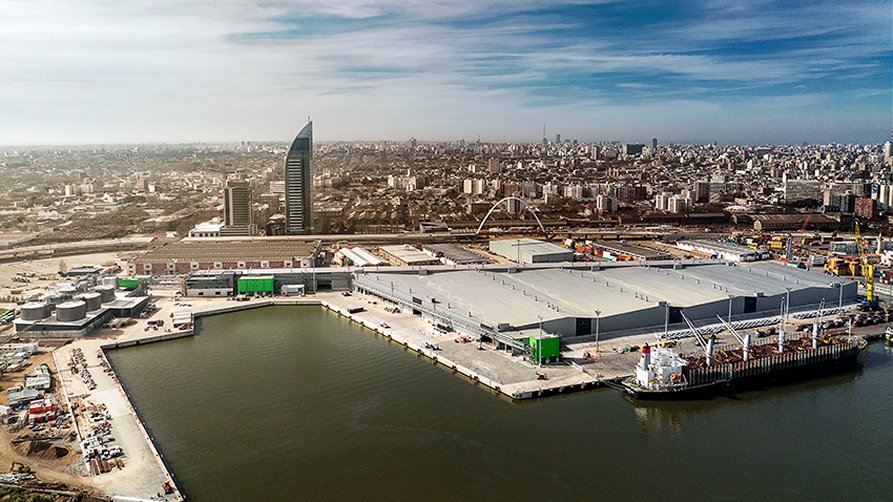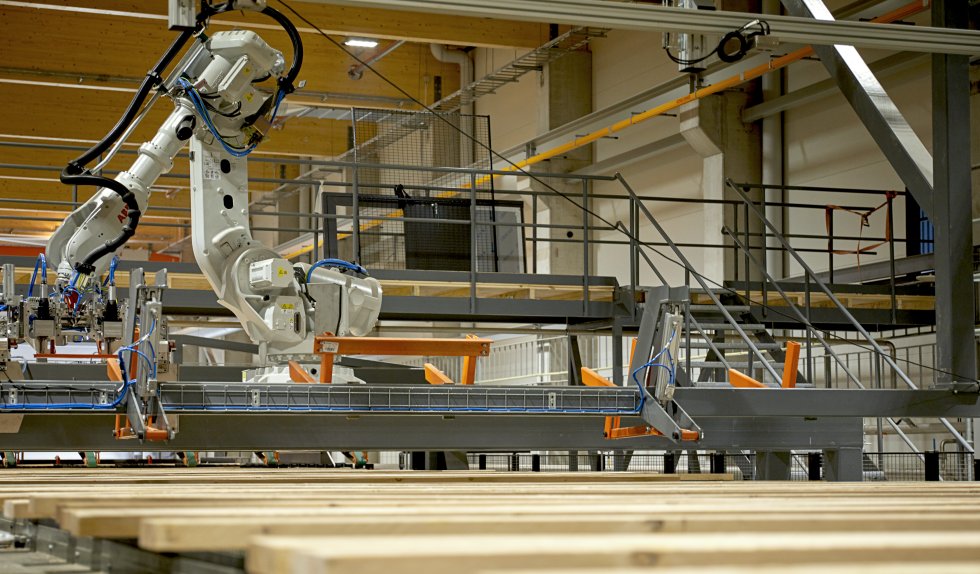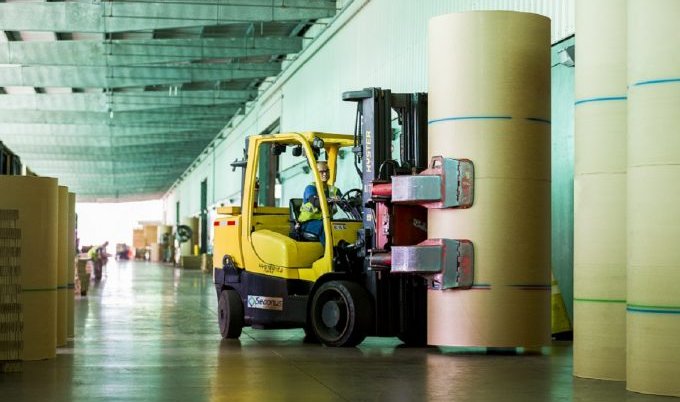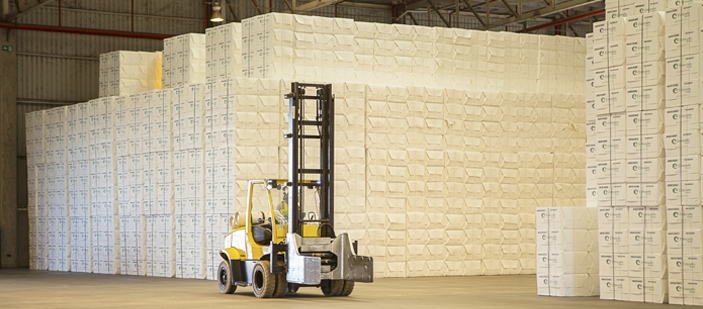|

UPM Inaugurates Its New Deep Sea Pulp Terminal in the Port of Montevideo, Uruguay
Oct. 5, 2022 - UPM inaugurates today its new pulp terminal in the port of Montevideo, Uruguay. This investment of approximately USD 280 million is a fundamental part of UPM’s USD 3.47 billion growth investment in Uruguay that includes a state-of-the-art pulp mill in Paso de los Toros, new eucalyptus tree nursery as well as local community investments in Paso de los Toros.
“This is a significant milestone in our growth project in Uruguay. The new pulp terminal with direct connections from the new pulp mill and to the global markets plays a key role in the growth and competitiveness of UPM’s pulp business,” says UPM President and CEO Jussi Pesonen. “The public infrastructure investments to the deep sea port and railway improve the competitiveness of all export sectors in Uruguay.”
The new pulp terminal is located in the newly developed deep sea port in Montevideo, and it will have a direct rail connection to the new UPM Paso de los Toros mill. In the future, all UPM pulp from Uruguay will be shipped with fully loaded ocean vessels directly from Uruguay. This is a significant change to the current logistics that have depended on the deep sea ports in Brazil. The new direct connection from Uruguay to global markets increases efficiency and supply security.
UPM will operate the pulp terminal as a long-term concession holder. The terminal will operate 24/7 with an annual operating capacity of over 2 million tonnes of pulp and approximately 100 ships per year, creating a 60% increase in the total annual cargo exported from the port of Montevideo. The terminal will employ approximately 100 people, with another 200 people working in the loading and unloading of cargo ships. The terminal includes a large storage warehouse of over 50,000 square meters, a control room, logistics spaces and offices.
UPM’s new 2.1 million tonne per year greenfield eucalyptus pulp mill near Paso de los Toros in central Uruguay is scheduled to start production by the end of Q1 2023.
SOURCE: UPM |
|

Metsä Fibre’s State-of-the-Art Sawmill Starts in Rauma, Finland
Sept. 30, 2022 - Metsä Fibre announced that its new state-of-the-art pine sawmill in Rauma, Finland, has moved from production test run to continuous sawn timber production. The sawmill is operating continuously in three shifts.
Construction of the Rauma sawmill started in the spring of 2020, and the value of the investment is approximately EUR 260 million. This is the largest sawmill investment ever in Finland.
The Rauma sawmill is a worldwide forerunner in technology, efficiency and operating models. Technological innovations such as machine vision, self-learning artificial intelligence and integrated information systems that control the sawline’s various functions provide improved conditions for the production of sawn timber of consistent quality and the sawmill’s industrial efficiency. With the aid of new technology, the Rauma sawmill’s operation is controlled from a single central control room, and sawn timber moves along the converting line without any manual work stages.
“Demand for high-quality, sustainably produced sawn timber is growing worldwide, particularly in demanding component and woodworking industry applications,” said Ismo Nousiainen, CEO of Metsä Fibre. “The new sawing capacity helps us respond to this growth.
“Sawn timber is an excellent example of a responsible and sustainable product, since the carbon contained in trees is stored in buildings or in various wood products made from sawn timber throughout their life cycle. The sustainability of the sawn timber we produce is based on sustainably managed forests, certified and traceable wood raw material and low-carbon production,” Nousiainen explained.
The new sawmill has directly created 100 new jobs in Rauma. The sawmill also provides work to approximately 500 people across its direct value chain. The sawmill’s employment impact during the construction phase was roughly 1,500 person-years.
The annual capacity of the Rauma sawmill is 750,000 cubic metres of pine sawn timber, and the annual use of pine logs sourced in Finland is around 1.5 million cubic metres. The sawn timber produced in Rauma is sold mainly to Europe and Asia. The sawmill’s location enables smooth logistics to transport the sawn timber to customers through the Port of Rauma. The new sawmill does not have its own warehouses. Instead, finished sawn timber is packaged and automatically loaded onto lorries, which transport it directly to the port.
The new sawmill has been built next to Metsä Fibre’s Rauma pulp mill.
“The full utilisation of the wood raw material is central to our unique bioproduct concept. Log wood is used as raw material for the sawmill. The bark and sawdust generated during the production of sawn timber are used for bioenergy and the chips are used as raw material for pulp. Pulp production generates bioenergy for the sawmill, and the surplus energy is sold outside the integrated mill. In the future, this investment will enable both the Rauma sawmill and pulp mill to operate without using any fossil fuels,” Nousiainen said.
SOURCE: Metsä Fibre |
|

JAXPORT to Serve as Host Port for International Forest Products Supply Chain Event
Sept. 9, 2022 - The Jacksonville Port Authority (JAXPORT) will serve as the host port for the 24th annual Pulp and Paper International (PPI) Transport Symposium. The event is the longest-running conference dedicated to the forest products supply chain and attracts global leaders from throughout the industry.
Organized by Fastmarkets RISI, in association with the International Forest Products Transport Association (IFPTA), PPI Transport Symposium 24 is September 18-20, 2022, at the Sawgrass Marriott Resort and Spa in Ponte Vedra Beach, Florida.
Participants will explore trending topics impacting forest products shippers, including the pandemic's impact on capacity and planning, how carriers are dealing with global port congestion and what cargo owners should expect in the months ahead, as well as the steps the industry is taking to reduce greenhouse gas emissions.
As the host port, JAXPORT will provide attendees a tour of pulp and paper operations at terminal operators SSA Marine at JAXPORT's Blount Island Marine Terminal and Seaonus at the port's Talleyrand Marine Terminal.
JAXPORT leadership will also host the event's welcome reception.
"We look forward to welcoming our friends and colleagues from throughout the forest products supply chain and showcasing the advantages that have made Jacksonville a leader in this industry," said JAXPORT Director of Forest Products Rick Schiappacassee. "During the event, customers will have a chance to see our facilities, meet our team, and learn more about the unmatched efficiencies and customer service that have earned JAXPORT recognition as a top port in the nation for service and value."
Last year, JAXPORT was the No. 1 port in the US Southeast by tonnage for imports of forest products breakbulk shipments. More than a million tons of forest products shipped through JAXPORT in calendar year 2021.
More details, including speakers, agenda, sponsor opportunities and registration, are available through Fastmarkets' website: Transport Symposium 24
SOURCE: Jacksonville Port Authority (JAXPORT) |
|

Brazil's Pulp and Paper Sector Sees Growth in Production, Exports, in First Half 2022
Aug. 31, 2022 - According to the Brazilian Tree Industry (Ibá), in the first half of 2022, pulp production grew 7.8% compared to the same period of the previous year, and paper production showed a 3.1% increase.
Editor's note: The Brazilian paper segment includes: packaging and wrapping, printing and writing, tissue, newsprint, cardboard, and other grades.
"The forest products industry is going hand in hand with the new green economy that is being designed in Brazil and around the world," stated Ambassador José Carlos da Fonseca Jr., Ibá's Executive Director. "Companies in the cultivated tree sector develop more than 5,000 bioproducts essential to our daily life such as paper packaging, toilet paper, diapers, laminate floors, furniture, wood panels, among many others. With technology and innovation, items are sustainable alternatives to those of fossil origin.
"Consumers are demanding more sustainable products, and the process involves everything from materials and production to the life of these items as a way to reduce greenhouse gas emissions. This demonstrates how ready the industry is to meet the demands of society," da Fonseca concluded.
Following its mission to provide bioproducts to society around the world, the Brazilian forest-based industry has recorded advances in exports of all segments. In values, the sector brought foreign exchange to the country that totaled US$ 5.5 billion (+33.0%) between January and June 2022. This result favored the trade balance of the sector, which totaled US$ 5.0 billion (+38.8%).
In the first half of 2022, China remains the main destination for pulp exports produced in Brazil, reaching US$ 1.5 billion traded. Latin America remains Brazil's leading paper buyer and has totaled US$ 966 million in product negotiations. The region is also the foreign market that most acquired wood panels, which totaled US$ 126.3 million.
Pulp, Paper, and Wood Panels Performance in First Half 2022
In the first half of 2022, pulp production reached 12 million tons (+7.8%). Paper work also showed progress in the same period, with 5.4 million tons, a growth of 3.1%. Packaging papers, which reached 3.0 million tons (+8.1%) and sanitary papers (+1.2%) were highlighted. Charcoal reached 1.8 million tons (+4.4%).
Paper sales in Brazil in the first half totaled 2.7 million tons. The wood panels, in turn, totaled 3.4 million m3.
Pulp exports between January and June totaled 9.0 million tons, a growth of 15.9%. Paper exports totaled 1.3 million tons in the same period (+40.5%).
The Brazilian Tree Industry (Ibá) is the association responsible for the institutional representation of the production chain of planted trees, from the field to the industry, together with its main stakeholders. Launched in April 2014, it represents 49 companies and nine state entities of products originating from the cultivation of planted trees — wood panels, laminate floors, cellulose, paper, energy forests and biomass — as well as independent producers of planted trees and institutional investors.
SOURCE: The Brazilian Tree Industry (Ibá) |
|
|